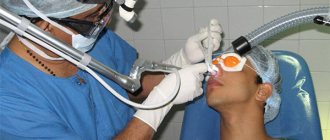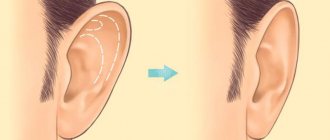The influence of age on operations under anesthesia
Over time, human organs wear out and nothing can be done about it. We are getting old. For some, external signs of aging appear earlier, for others later, but as a rule, everyone experiences the following health problems:
- blurred vision
- weakening of the hearing aid
- decreased functions of the musculoskeletal system
- mental disorders
- absent-mindedness
- memory losses
- insomnia
- interruptions in heart function
- decreased activity
- blood thickening
This is a small list of age-related changes, in fact there are many more of them and each case follows an individual scenario. Each of these points can cause complications after an operation performed under anesthesia. Old people have a hard time coming out of anesthesia, which creates additional risks. If necessary, the doctor will still perform the operation, but only after an extensive examination of the elderly patient’s health.
Indications for general anesthesia
Under general anesthesia in dental practice, it is possible to eliminate almost all problems that arise in the oral cavity - from simple dental caries to complex maxillofacial operations. The patient seeks this type of help, most often, not because of pain, but because of severe fear or medical conditions that interfere with the doctor’s work (allergies, gag reflex, mental illness, etc.). More information about the types of anesthesiological support and how treatment is carried out with switched off consciousness can be found on our website. Here we will talk about the process of postoperative restoration of the patient’s activity , depending on the method of pain relief and the medications administered.
Preparing an elderly person for anesthesia
So that doctors can exclude unfavorable factors during the operation, they prescribe a number of examinations to the patient:
- Standard collection of tests. Specialists laboratory examine the patient's blood, urine and feces. If the test results are poor, doctors first carry out a course of treatment and various measures to prepare for the upcoming operation. If blood counts are poor, iron-rich medications or blood transfusions may be prescribed.
- ECG
- fluorography
- Ultrasound
After collecting the necessary information about the patient’s health, the doctor will be able to calculate the likelihood of negative consequences and prepare for them.
Types of anesthesia for older people
To avoid negative consequences in the postoperative period, a good doctor will choose the most gentle method of anesthesia for an elderly patient. In Russian medicine, 3 main types are used:
- Local anesthesia numbs the local area of skin.
- General anesthesia is used for major surgical interventions that are accompanied by severe pain.
- The person is in a state of sleep during the operation.
- Combined
Only an anesthesiologist, together with a surgeon, can determine the required type of anesthesia. Although specialists often listen to the patient’s wishes. If life is not in danger, doctors will accommodate you halfway.
Why general anesthesia is dangerous - myths about anesthesia
Over the past decades, general anesthesia has become much “softer”: the introduction of drugs with fewer side effects, a significant reduction in the use of narcotic drugs, the development and active use of a new generation of gas mixtures that enter the lungs through a ventilator and support a person in medicated sleep as much as necessary, all this has led to the fact that modern anesthesia has become practically safe. Proof of this is the fact that these days there is practically no question about the duration of anesthesia. If in the 70s, hours were counted, and the longer a person was in medicated sleep, the worse he “moved away from it,” but now serious operations last for 10–12 hours, and the next day the patient is transferred to a ward, which called “with a clear head.”
Another brick in the safety wall is the active introduction of imaging techniques in anesthesiology. If previously a doctor punctured large vessels and installed catheters in them blindly, based only on anatomical landmarks and his own experience, today everything happens under ultrasound control, the risk of error and the development of complications tends to zero.
The equipment controls the depth of anesthesia, automatically changes breathing parameters, selecting optimal criteria for each specific moment of the operation. The workplace of an anesthesiologist is difficult to distinguish from the cockpit of an airliner.
As you know, in the past, the liver and brain suffered the most from serious anesthetic drugs. Therefore, special attention is paid to neuro- and hepatoprotection. Modern drugs have minimal hepatotoxicity and virtually no damage to the liver, neurotoxicity is also significantly reduced, and special drug regimens are used to protect the brain. And it works, because stories about memory loss or deterioration of brain activity after anesthesia are becoming less and less common.
How to restore the health of an elderly person after surgery
Of course, an elderly person needs care, especially during the difficult postoperative period. Doctors use all kinds of health checks using special equipment. Be sure to check heart function, blood pressure and other body functions. After the operation, the pensioner is provided with care and the following medical measures are taken:
- procedures for treating sutures with antiseptic agents, as well as regular dressing changes
- taking medications, in particular antibiotics
- correcting electrolyte imbalance
- body temperature control
- emotional support
In fact, all points are simple to implement and require only conscientious implementation.
Possible complications after anesthesia in older people
Old people experience many more postoperative complications than young people. This is quite predictable, because in old age the immune functions of the body decrease noticeably. Senile dementia or dementia is often observed as a complication after recovery from anesthesia. Moreover, the phenomenon can manifest itself long after the operation. At first, such changes may not be noticeable. Sometimes, the first symptoms are recorded only a few months after the use of anesthesia, and periodically, even after several years. Family members cannot always figure it out right away and such things become a very unpleasant surprise for them. The most common complications after anesthesia include:
- Depression that can last for a very long time. In this case, you should pay very close attention to the elder’s internal state. You may need to meet with a psychotherapist.
- A terrible manifestation of postoperative complications is acute psychosis. In this state, the elderly person is captured by delusional ideas. Often the patient can see hallucinations and hear non-existent voices. As a rule, a person does not realize that he is not himself.
- Mental disorders that are activated by outbreaks a short time after surgery. In this case, timely assistance from a psychotherapist can help.
Such interventions, as well as potent drugs, have a negative impact on the health of older people. The nervous system, which is already worn out due to old age, is subjected to serious tests. Irregularities in the heart rhythm may occur, even if the operation was performed on another organ. The health of a pensioner is very fragile and the likelihood of harm is quite high. But on the other hand, if such measures are required, do not rush to refuse. You just need to prepare more carefully.
Anesthesia and anesthesia
We consider it absolutely necessary to inform patients as much as possible about everything that awaits them during and after surgery.
It is very important that the patient is able to optimally prepare for the rather complex ordeal of surgery. It’s not for nothing that they say: forewarned is forearmed. Many years of experience show that only patients who are well informed in advance undergo surgery easily, recover quickly and return to active life. Will I be in pain during the operation?
Such a question for modern medicine sounds somewhat naive, because back in the second half of the 19th century, pain during surgery was over. Since then, anesthesiology (a branch of medical science that studies various types of anesthesia and anesthesia) has come a tremendous way in its development and today has everything necessary to ensure that any, even the most complex and extensive operation is painless, safe and comfortable for the patient. However, even the most knowledgeable patient sometimes worries and asks a similar question: will it hurt me during and immediately after the operation, when the anesthesia wears off? The answer in this case may sound like this: if the anesthesiologist (a specialist in pain relief and monitoring the patient’s condition during surgery and in the immediate postoperative period) is a high-class specialist and performs his work professionally, pain during the operation and after the end of the surgical anesthesia is not will.
What types of pain relief exist in modern medicine?
What types of anesthesia are used for which operations? Pain relief or anesthesia can be general or local. For minor operations (in urology these are many operations on the penis and scrotal organs, in gynecology - minor interventions on the labia, vagina, external urethral opening, etc.), local anesthesia . It consists of introducing a special substance, a local anesthetic (lidocaine, xylocaine, marcaine, etc.), using a syringe into the area of the operation being performed or into the area of the peripheral nerves that control the pain sensitivity of the operation area, which temporarily turns off the pain sensitivity. Local anesthesia can be infiltration (injection of an anesthetic directly into the area of incision and surgical manipulations), conduction (injection of an anesthetic into the area of large nerves that provide pain sensitivity in the operation area, but are themselves located outside this zone) and combined. During an operation under local anesthesia, the patient is conscious, he sees and hears everything that happens in the operating room, he can also feel all the touches of the surgeons (not pain), and sometimes experience minor pain. General anesthesia or anesthesia (the word anesthesia means only general anesthesia with the switching off of consciousness and pain sensitivity at the level of the brain, the colloquial expression “general anesthesia” is meaningless) consists of temporarily switching off the central zones of pain sensitivity and the transmission of pain impulses in the brain or spinal cord . Anesthesia can be intravenous or intubation. During intravenous anesthesia, a drug is injected into the patient's vein, which causes the pain sensitivity centers of the brain to be turned off and at the same time turns off the patient's consciousness, maintaining, as a rule, spontaneous breathing. Intravenous anesthesia is used for minor and medium-sized operations when local anesthesia cannot provide adequate pain relief. This type of anesthesia is also used at the request of the patient, when he would not like to be conscious during the operation, see, hear and feel everything that happens in the operating room. Intubation anesthesia consists of a preliminary temporary shutdown at the level of the brain of the patient’s central pain sensitivity and consciousness, temporary paralysis of the muscles, followed by intubation (insertion of a breathing tube into the trachea) and artificial ventilation of the lungs (artificial respiration) using special breathing equipment for the entire duration of the operation. This type of anesthesia is used for extensive operations on the abdominal and thoracic cavities, pelvic organs and retroperitoneal space (abdominal surgery). Such operations require that the patient's muscles are relaxed and involuntary or voluntary movements do not interfere with the surgeon and are completely excluded. Intubation anesthesia can also be used in cases where intravenous anesthesia or local anesthesia may be insufficient to provide adequate pain relief and control of the patient’s condition during medium-sized operations, as well as for medical reasons related to the presence of certain diseases of the person being operated on. A special place among the methods of general anesthesia is occupied by spinal (epidural) anesthesia (Fig. 1), which consists of introducing local anesthetics of varying durations of action (lidocaine, xylocaine, marcaine, etc.) into the spinal canal, which leads to temporary shutdown of pain and tactile sensitivity , as well as motor function below the injection site.
Rice. 1 Performing spinal anesthesia by an anesthesiologist.
Spinal anesthesia is usually supplemented with so-called intravenous sedation (medication sleep) and the patient sleeps during the operation.
This type of anesthesia is used for various operations on the pelvic organs and external genitalia. What are the characteristics of the patient’s recovery from various types of anesthesia and the immediate postoperative period?
What needs to be done to speed up the patient’s recovery and recovery after surgery? Very often, patients wonder what will happen to them and how they will feel when the anesthesia wears off? Of course, this depends on the type of anesthesia used, and on the type and extent of the operation, as well as on the general condition and individual characteristics of the patient’s pain sensitivity. After the cessation of local anesthesia , after minor operations, patients, as a rule, experience slight pain in the area of the surgical wound (the site of the surgical injury cannot help but hurt). To relieve these pains, it is usually enough to take a non-narcotic analgesic (painkiller) such as analgin, ibuprofen or diclofenac (Voltaren). If the effect of these drugs is not sufficient, more powerful non-narcotic analgesics are used - ketorol, tramadol, ketonal, etc. Typically, postoperative pain during minor and medium-sized operations lasts no more than 1 to 2 days. If they last longer, this should be brought to the attention of your doctor. After intravenous and intubation anesthesia , patients feel as if they were after a good and deep sleep, sometimes they remember bizarre dreams, occasionally experience a headache, note nausea, and in isolated cases vomiting. After intubation anesthesia, there is a soreness and discomfort in the throat, which is associated with the presence of a breathing tube there during the operation. Some medications used for these types of anesthesia can cause breathing problems. In this regard, patients are in the first hours after surgery under close supervision of medical personnel of the anesthesiological service (anesthesiologist, nurse anesthetist). Only when there is absolute confidence that there can be no breathing problems, the patient is transferred to a regular ward. After medium-sized, and especially after large abdominal operations, the patient may experience fairly intense pain for several days. In these cases, postoperative pain relief becomes a critical part of the patient's treatment in the first days after surgery. There are several postoperative pain relief regimens that are selected strictly individually and guarantee the patient’s comfortable condition in the first days after surgery. In the early postoperative period after major abdominal operations, in order to speed up the patient’s recovery and recovery, three main problems . The first problem is pulmonary rehabilitation. It is often difficult for the patient to breathe deeply and move in bed. This can lead to pulmonary congestion and even post-operative pneumonia (pneumonia). To avoid this, the patient is placed with the head end slightly elevated, he is recommended to move in bed and regularly (every 1 - 2 hours) do breathing exercises (inhaling with resistance using a special spirometer or exhaling into a jar of water). The second common postoperative problem associated with prolonged lying down and lack of muscle activity is stagnation of blood in the veins of the legs , the formation of blood clots, which can travel through the veins to the heart and further into the pulmonary artery (thromboembolism) and cause sudden death. To prevent this formidable complication, the patient is given drugs that reduce blood clotting, and constant compression (squeezing) of the legs is also applied using an elastic bandage or, which is much better, simulating natural muscle activity, variable compression using a cuff of a special device. And finally, the third most important postoperative problem is rehabilitation of the digestive system .
It is known that after major operations, especially on the abdominal and pelvic organs, there is a temporary decrease in intestinal peristalsis (contractility), which, as a rule, recovers on its own 2–3 days after surgery. To speed up this process, patients are advised to gradually return to their normal diet. On the first day after the operation, they are only allowed to drink water, on the second day they are allowed to consume liquid nutritious foods (jelly, jellies, broths), from the third day they supplement the diet with pureed boiled vegetables and minced lean meat (young beef). The solution to all three main problems of the postoperative period is facilitated by early activation of the patient. We try to ensure that by the end of the first day after extensive abdominal operations, the patient sits in bed or in a chair, and by the end of the second day he gets up, washes himself and begins to walk around the ward. On the 3rd - 4th day after major abdominal operations, the vast majority of our patients begin to walk along the corridor of the department and prepare for discharge from the hospital. Why is it important to be discharged from the hospital as early as possible?
In the hospitals that we inherited from the Soviet healthcare system, even today postoperative patient care is often organized in such a way that patients remain in the hospital after major operations for one to several weeks. Many people mistakenly believe that the longer a patient remains in the hospital after surgery, the more “fully” he will recover. Studies conducted in leading Western countries have shown that everything is happening quite the opposite. It has been proven that the longer the patient's postoperative stay in the hospital continues, the more often infectious complications (wound suppuration) caused by the so-called hospital infection occur. It is worth noting that the state of affairs with hospital-acquired infections in Russian hospitals clearly leaves much to be desired, so there is no point in staying in them. Another important argument in favor of early discharge from the hospital lies in the field of human psychology and is expressed by the proverb - houses and walls help. In familiar and comfortable home conditions, recovery occurs much faster. A necessary condition for early discharge from the hospital is the presence of close people who could provide the patient with the minimum necessary care at home. If necessary, medical personnel can come to the home of postoperative patients at the Andros Clinic.
It is important to know that you should reduce or abstain from smoking in the postoperative period. This will significantly speed up the healing of the postoperative wound.
DEAR PATIENTS! REMEMBER THAT QUALIFIED ANESTHETIC CARE AND COMPLETE POST-OPERATIVE REHABILITATION ARE ESSENTIAL COMPONENTS OF SURGICAL TREATMENT. ANDROS CLINIC HAS ON ITS STAFF A HIGHLY QUALIFIED ANESTHESIOLOGIST CAPABLE OF CONDUCTING ANESTHETICS OF ANY COMPLEXITY AND PROVIDING HIGHLY PROFESSIONAL POSTOPERATIVE CARE AND REHABILITATION EVEN IN THE MOST COMPLEX CASES. THE CLINIC USES THE MOST PROGRESSIVE METHODS OF POSTOPERATIVE PATIENT MANAGEMENT, EARLY ACTIVATION OF PATIENTS, AND QUICK DISCHARGE FROM THE HOSPITAL. AS A RESULT, PATIENTS EVEN AFTER THE MOST COMPLEX OPERATIONS (RADICAL PROSTATECTOMY FOR PROSTATE CANCER) ARE DISCHARGED FROM THE HOSPITAL FOR 4 - 5 DAYS AND 3 - 4 WEEKS AFTER THE OPERATION RETURN TO ACTIVE WORK TE.









